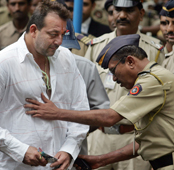-
 Sanjay Dutt is frisked by a policeman as he arrives at a special court trying cases of the 1993 Mumbai bombings (AP Photo/Rajesh Nirgude)
Sanjay Dutt is frisked by a policeman as he arrives at a special court trying cases of the 1993 Mumbai bombings (AP Photo/Rajesh Nirgude)
A legal analysis of the Sanjay Dutt verdict
The question one has to ask oneself is: If Sanjay Dutt was arrested for the same offence, and it had no connection with the Bombay Serial Bomb Blasts, would the Court’s verdict still be the same?
On Thursday, the Division Bench of the Supreme Court of India confirmed the conviction of Sanjay Dutt, and two of his other accomplices, but reduced the sentence awarded by the Special Court by one year. Sanjay Dutt, who has already spent 18 months in custody, after the verdict has roughly three and a half years of jail term left to serve. Should Sanjay Dutt because of his background and stature in society, or because of his Munna Bhai avatar, be treated differently for the offence which he has been charged with and found guilty of? The obvious answer is no. But still there is a sense of unease in accepting his condemnation.
Sanjay Dutt was charged with offences under the Terrorist and Disruptive Activities (Prevention) Act (TADA) for the terrorist act of causing serial bomb blasts in Mumbai in 1993, its conspiracy, abetting; harbouring and concealing terrorists; and the membership of a terrorist gang. In addition to this, he was also tried for offences under the Indian Penal Code, the Arms Act, the Explosive Act, the Explosive Substances Act, and the Prevention of Damage to Public Property Act. However, the Special Court, formed under the TADA, found him guilty only for the offence punishable under Sections 3 and 7 read with Sections 25 (1-A) and (1-B)(a) of the Arms Act, 1959 and sentenced him to suffer Rigorous Imprisonment (RI) for six years, along with a fine of Rs. 25,000 (in default of which he was to further undergo RI for a period of 6 months). It is relevant to mention that the findings of the Special Court have not been challenged by the State and, therefore, Sanjay Dutt has been acquitted of other charges under the TADA, the IPC, the Explosives Act, the Explosive Substances Act, and the Prevention of Damage to Public Property Act.
Conversely speaking, if we accept the Special Court’s verdict, Sanjay Dutt had no role whatsoever in the Bombay Serial Blasts, or was aware of any conspiracy hatched by other accused persons. What the apex court had before it were the offences relating to the possession of unlicensed weapons on a particular day which was during bad times (in the months after the infamous Bombay Riots).
The court’s verdict raises two primary legal concerns. Firstly, Sanjay Dutt’s conviction is almost entirely based on his confessions and the confessions of the other accused. Almost half of the 147 pages of the verdict are devoted to the court discussing the confessional statements made by the accused persons and the law that pertains to this. Article 20(3) of the Indian Constitution declares that “no person accused of any offence shall be compelled to be a witness against himself”, thus, incorporating the principle of protection against self-incrimination under duress or otherwise. However, under the TADA, which now stands repealed, confessions made by the accused before a police-officer are admissible as evidence in the trial.
A five judge bench of the Supreme Court in Kartar Singh vs. State of Punjab (1994), has upheld the validity of the provision that allows for confessional statements to be admissible as evidence. However, we need to remember that confessions as a form of evidence in trial can be extremely dangerous. There are several situations under which an accused can confess to a crime which he has not committed. The obvious objection to the use of a confessional statement is the use of torture by police officers to obtain confessions from the accused persons. However, recent research shows that people confess for many other reasons (eg. duress, coercion , intoxication, diminished capacity, mental impairment, ignorance of the law, the threat of a harsh sentence, misunderstanding the situation etc) and not just because of torture, or its threat.
In Sanjay Dutt’s case too there was a confession, to a police officer, which was later retracted by him but, since the retraction came many months after the confession, the Supreme Court refused to remove it from the evidence against him.
But even if we are to assume that Sanjay Dutt’s confession was true, that it was made out of his own volition, the fact remains that the confession was made under the provisions of the TADA, for which he was acquitted. The senior counsel arguing on behalf of Sanjay Dutt correctly pointed out that the confessions made under the TADA cannot be used to convict Sanjay Dutt under the Arms Act, especially when he has been acquitted of all terror charges. He further pointed out that if a confession to the police becomes admissible irrespective of the fate of the TADA charge, then it would lead to invidious discrimination between the accused, who were charged (but acquitted) under the TADA along with other offences and those who were accused only of non-TADA offences. However, the Supreme Court rejected this contention based on the Rajiv Gandhi assassination case’s reasoning (State of Tamil Nadu vs. Nalini, 1999) and held that confessions made under the TADA would continue to remain admissible in the case of other offences, under any other law, which were tried along with the TADA offences, no matter that the accused was acquitted of offences under the TADA in that trial.
The second concern with this verdict is the sentencing. The question of what makes for an adequate yet appropriate sentence has always been a very difficult question. Sentencing, in India, is mainly on the discretion of the judges. There are several, often competing factors that must be taken into account before arriving at a just sentence. The Constitutional Bench in Bachan Singh vs. State of Punjab (1980) has held that in fixing the degree of punishment or making the choice of sentences for various offences including one under section 302, the court should not confine its consideration principally or merely to the circumstances connected with a particular crime but also give due consideration to the circumstances of the criminal.
Various theories of punishment, from deterrence (for the accused and the public at large) to rehabilitation to reformation to re-absorption in the society, need to be adjusted in a libertarian Constitution. The objective is that the accused must realize that he has committed an act which is not only harmful to the society of which he is an integral part but is also harmful to his own future— both as an individual and as a member of the society. (This view has been confirmed by the Supreme Court in the landmark case of Goswami BC vs. Delhi Administration, 1973).
Sanjay Dutt was held guilty of offences under the Arms Act for which the maximum sentence prescribed is of 10 years, and the minimum sentence of 5 years, and he shall also be liable to fine. In a way, while passing the verdict on conviction the hands of the Court were tied and they could not have gone beyond the statutory prescribed jail term. However, what the Supreme Court could have done is given him the benefit of the Probation of Offenders Act. To clarify, putting an accused on probation does not mean he is not guilty of the offences he has committed, in fact it is the recognition of the doctrine that the object of criminal law is more to reform the individual offender than to punish him (Rattan Lal vs. State of Punjab, 1979). When the Court decides to put an accused on Probation, the Court can prescribe any condition (like regularly reporting to the probation officer or informing the police station when leaving the country etc.) and give a chance to the accused to reform himself. If the accused does not fulfill the conditions he can be recalled and sentenced as per the provisions of law.
In Sanjay Dutt’s case, and in my respectful disagreement with the verdict, I think the Court overlooked the idea of reformation as an objective of punishment. His offence is an offence which has no victim, and all the charges of being a terrorist have been done away with. In fact, even the State agrees with the findings of the trial court and has not appealed against the acquittal. There has been no previous conviction of the accused, which means that this instance is his first ‘offence’. The verdict further records that there has been no complaint either from the lower court, or any subsequent criminal offence committed by the accused during the period of trial. In such a scenario, the accused deserved the benefit of probation. There is no doubt that the court has discretion in deciding whether to give an offender the benefit of probation or not. In deciding so the Court has to give regard to the circumstances of the cases, including the nature of the offence and the character of the offender. However, in the absence of any set objective standard the discretion of the judge becomes subjective with each case.
Recently, in Sunder @ Sundararajan vs. State Tr.Insp. Of Police on February 5, 2013, the Supreme Court confirmed the death penalty of an accused for killing a child for ransom. While upholding the death penalty the Court observed, “Kidnapping the only male child was to induce maximum fear in the mind of his parents. Purposefully killing the sole male child, has grave repercussions for the parents of the deceased. Agony for parents for the loss of their only male child, who would have carried further the family lineage, and is expected to see them through their old age, is unfathomable.” Whereas, on January 28, 2013, Mohinder Singh vs. State Of Punjab, commuted a life sentence where a man, already convicted of raping his daughter, killed his wife and daughter in the most gruesome manner after breaking parole. What I am suggesting here is not the death penalty for the latter case, but a set objective and mandates for crucial decisions like sentencing, parole, or probation.
In Sanjay Dutt’s case there was need to observe in a more reasoned manner the nature of the crime and also the implication of a conviction that would come almost 20 years after. The right to speedy trial is a fundamental right of every accused. A verdict of conviction without any probation after over 19 years of trial, for an offence which had no victim, especially when the main accused for the serial blasts of 1993 have still not been apprehended, is a sort of harshness, not justice.
Of Arms and a Man
OpinionMarch 2013
 By Rajat Kumar
By Rajat Kumar
Rajat Kumar is a Delhi based lawyer who works mostly in the area of criminal and civil litigation. He has also been involved in cases concerning copyright, sexual minority rights and film-censorship.













